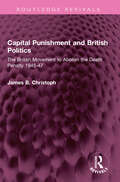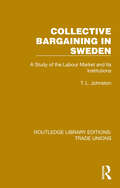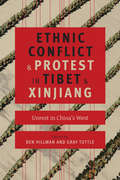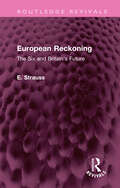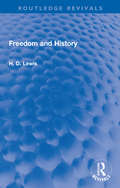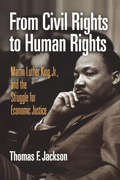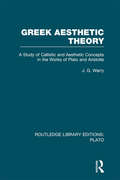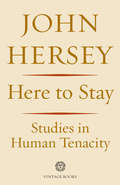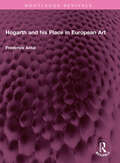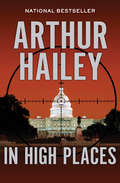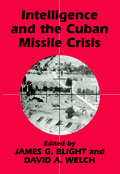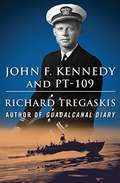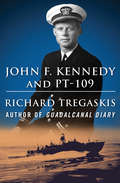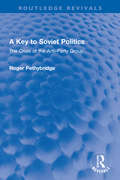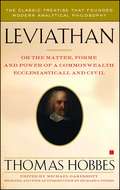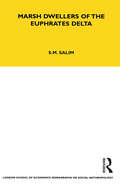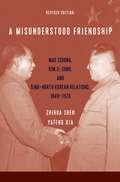- Table View
- List View
Building the Institutions of Peace: Swarthmore Lecture 1962 (Routledge Library Editions: Peace Studies)
by J. Duncan WoodThe pacifist principle, so cogently expressed in the Declaration to Charles II, has led succeeding generations of Quakers to consider the application of this principle to international affairs. William Penn’s ‘Essay towards the Present and Future Peace of Europe’, which proposes international machinery for keeping the peace, is the first of a series of Quaker contributions to a body of thought which has been given some practical expression during the twentieth century. Originally published in 1962, the present lecture is not occasioned by a significant anniversary of William Penn’s essay, published in 1693, but by the urgent relevance of its ideas to the current international impasse. The lecture is based on the assumption that the tradition of Quaker political thinking which Penn initiated remains a living and vital one, to whose cultivation and renewal Friends can rightly devote a measure of their time, their energy and their concern. This requires that Friends think deeply about the nature of the present struggle for world power and the measures that can be taken to abate it; about the direction which existing international institutions should take in order to promote the present and the future peace of the world; and about the role of a religious society both within and without the realm of politics. Of necessity and intention, the lecture asks more questions than it can answer.
Capital Punishment and British Politics: The British Movement to Abolish the Death Penalty 1945-47 (Routledge Revivals)
by James B. ChristophFirst published in 1962, Capital Punishment and British Politics illuminates the process of political decision-making in Britain by analysing the complex activities that led to the passage of a major piece of social legislation, the Homicide Act of 1957. His case study, based on dozens of interviews, reveals in detail the workings of British politics and assesses the impact of the clash of ideas and interests on governmental policy. After surveying the legal and historical antecedents of the controversy surrounding the Act, the author traces the development from the abortive attempt to abolish the death penalty under the Labour Government through the spectacular murder cases of the early fifties to the compromise legislation successfully launched by a Conservative Government. Throughout the book analysis is coupled with description, and the concluding chapter demonstrates how this single case contained in microcosm many of the basic elements and dilemmas of the British political process. This fascinating study will be of great interest to students of politics and social legislation everywhere.
Collective Bargaining in Sweden: A Study of the Labour Market and Its Institutions (Routledge Library Editions: Trade Unions #13)
by T. L. JohnstonOriginally published in 1962, this book analyses and assesses the Swedish Government and structure of both trade unions and employers’ organizations, including the spread of unionism to white-collar workers. It then examines Swedish labour legislation, which established an act on Collective Contracts, a Labour Court and a mediation service. The book also shows the collective bargaining system at work under conditions of full employment, and examines critically the attempts to develop a policy for wages through the labour market organizations, rather than by government decree. Anyone, in mature or developing economies, concerned with collective bargaining and wage policies will find this lucid study of the Swedish system a rich source book for positive policies.
Conversations with Stalin
by Milovan Djilas Michael B. PetrovichMilovan Djilas was born in Montenegro, Yugoslavia, in 1911. He became a member of the Yugoslav Communist Party and was imprisoned for his political activities (1933-36). In 1938 Djilas was elected to the Central Committee of the Party and two years later a member of its Politburo. Soon after he became the loyal vice president of the country under Tito. These are his memories of his conversations with Stalin.
The Ethical Foundations of Marxism (Routledge Library Editions: Marxism #3)
by Eugene KamenkaThe Ethical Foundations of Marxism, first published in 1962 and corrected and revised for a 1972 edition, examines carefully and critically the origin, precise nature and subsequent role of Marx’s ethical beliefs. Drawing freely on Marx’s still largely untranslated philosophical works and drafts the author elicits the ethical presuppositions with which Marx began. He then examines the intellectual development that made Marx a Communist and seeks to clarify the place of Marx’s ethic in his mature, ‘materialist’ work. Professor Kamenka distinguishes sharply between the critical, ethical views of Marx and the inept, conventional applications of his doctrine by Engels. He appraises the ‘ethics’ of the Communist Party and traces the development of the moral and legal theory in the Soviet Union. He concludes by subjecting Marxism as a whole to a radical, ethical and philosophical criticism for which Marx himself laid some of the foundations.
Ethnic Conflict and Protest in Tibet and Xinjiang: Unrest in China's West
by Ben Hillman Gray TuttleDespite a decade of rapid economic development, rising living standards, and large-scale improvements in infrastructure and services, China's western borderlands have experienced a wave of ethnic unrest not seen since the 1950s. Through on-the-ground interviews and first-hand observations, the international experts in this volume create an invaluable record of the conflicts and protests as they have unfolded-the most extensive chronicle of events to date. The authors examine the factors driving the unrest in Tibet and Xinjiang and the political strategies used to suppress them. They also explain why certain areas have seen a higher concentration of ethnic-based violence than others. For anyone struggling to understand the origins of unrest in contemporary Tibet and Xinjiang, this anthology is essential reading.
European Reckoning: The Six and Britain's Future (Routledge Revivals)
by E. StraussOriginally published in 1962 this book advanced the debate about the Common Market and its implications for Britain by a significant step. It traces the growth of the Community during the crucial first stage of its existence in all its main aspects – tariffs and finance, competition, services and transport, labour and agriculture. There is an original assessment of the effects of the Great Boom of 1959-1961 on the EEC and vice versa. Detailed trade figures are used as a guide to the changing relations between the Six, highlighting the pivotal role of Germany. A short review of the problems of the associated territories and the attraction of the EEC to its neighbours leads up to the central issue of Britain’s European dilemma.
The Fifth French Republic (Routledge Revivals)
by Dorothy PicklesFirst published in 1960 and this revised edition in 1965, The Fifth French Republic tries to place the French Constitution of 1958 in its political context. It discusses themes like background to the Constitution; the republican tradition; prelude to the Fifth Republic; nature of the constitution; the electoral system and French electoral habits; institutions and parties of the Fifth Republic; politics of the Fifth Republic; the presidential sector in terms of community, Algeria, Defence and foreign affairs; and the personality of the Fifth Republic, to understand the nature of the evolution of "de Gaulle’s Republic" and the political climate that it has produced. This book is a must read for students and scholars of French politics, French history, European politics, and international relations.
Foreign Policy Decision-Making: An Approach to the Study of International Politics
by Richard C. Synder H. W. Bruck Burton SapinForeign Policy Decision-Making helps in strengthening international relations.
Freedom and History (Routledge Revivals)
by H. D. LewisFirst published in 1962, Freedom and History expresses a deep concern about freedom and the way it is imperilled by misunderstandings. The cause of freedom has not always been well served by its friends; by presenting one -sided ideas of freedom they have often paved the way for extreme forms of collectivism and despotism. Professor Lewis examines works of T.H. Green and compares Green with Locke and Rousseau, to show how much the attitude of Green and other idealists to questions of education, the family, punishment, slavery, and war was affected by the individualism that underlay their thought and the failure to pay due heed to the facts of moral perplexity. This in turn is seen to owe much to the optimism of late nineteenth century thinkers and the belief in inevitable progress. The volume also discusses the nature of history, objectivity in history, religion and history, and law and morality. Author subjects the works of writers like Reinhold Niebuhr, Barbara Wootton, Ian Ramsey, Leonard Hodgson to close critical examination and presents his own ideas about the relation of theology to historical fact. This book will be an essential read for scholars and researchers of political philosophy, religion, theology, ethics, moral philosophy, and philosophy in general.
From Civil Rights to Human Rights
by Thomas F. JacksonMartin Luther King, Jr., is widely celebrated as an American civil rights hero. Yet King's nonviolent opposition to racism, militarism, and economic injustice had deeper roots and more radical implications than is commonly appreciated, Thomas F. Jackson argues in this searching reinterpretation of King's public ministry. Between the 1940s and the 1960s, King was influenced by and in turn reshaped the political cultures of the black freedom movement and democratic left. His vision of unfettered human rights drew on the diverse tenets of the African American social gospel, socialism, left-New Deal liberalism, Gandhian philosophy, and Popular Front internationalism.King's early leadership reached beyond southern desegregation and voting rights. As the freedom movement of the 1950s and early 1960s confronted poverty and economic reprisals, King championed trade union rights, equal job opportunities, metropolitan integration, and full employment. When the civil rights and antipoverty policies of the Johnson administration failed to deliver on the movement's goals of economic freedom for all, King demanded that the federal government guarantee jobs, income, and local power for poor people. When the Vietnam war stalled domestic liberalism, King called on the nation to abandon imperialism and become a global force for multiracial democracy and economic justice.Drawing widely on published and unpublished archival sources, Jackson explains the contexts and meanings of King's increasingly open call for "a radical redistribution of political and economic power" in American cities, the nation, and the world. The mid-1960s ghetto uprisings were in fact revolts against unemployment, powerlessness, police violence, and institutionalized racism, King argued. His final dream, a Poor People's March on Washington, aimed to mobilize Americans across racial and class lines to reverse a national cycle of urban conflict, political backlash, and policy retrenchment. King's vision of economic democracy and international human rights remains a powerful inspiration for those committed to ending racism and poverty in our time.
Grace Coolidge and Her Era
by Ishbel RossOf the First Ladies to preside in the White House, Grace Coolidge was one of the most beloved for her diplomacy, her quiet sense of humor, her warm response to people everywhere. Calvin Coolidge adored her and appeared with her always at his side. The author traces Mrs. Coolidge's history from her childhood days in Vermont, through her years as teacher of the deaf, then as wife of the rising young politician whom she married in 1905, and eventually as First Lady. Her popularity was at its height when she went back with her husband to live in Northampton, Massachusetts. There is an absorbing picture of life and events in the White House during the 1920's, of the personalities and political figures surrounding the Coolidges, of the parties and manners, the clothes and menus, and of the family tragedy the nation shared when the Coolidges' young son died. Focused against the austere presidential regime is the panorama of one of the most flamboyant periods in American history--the years of prosperity preceding the crash in 1929. Miss Ross, who was a reporter for the New York Herald Tribune, writes of the 1920's with authority. She knew Mrs. Coolidge and had a chance to observe her at the inaugurations of President Harding and President Coolidge as well as on other occasions. She covered many of the notable news stories that figure in this narrative--the Lindbergh kidnaping, the Hall-Mills murders, the clash of Modernist and Fundamentalist forces in the churches, and numerous spectacles, crimes and follies of the prohibition era. The period background is sustained through the depressed 1930's, the war-clouded 1910's and down to the time of Mrs. Coolidge's death in 1957. In preparing this closely documented biography, Miss Ross had the benefit of family letters and reminiscences, and the recollections of Mrs. Coolidge's intimate friends. She shows her as wife, mother, hostess, community worker, baseball enthusiast and humanitarian who did notable work for the education of the deaf. The book has fresh and illuminating touches on Calvin Coolidge, husband and father as well as President.
Greek Aesthetic Theory (Routledge Library Editions: Plato)
by J G WarryThis book provides a clear and informed account of aesthetic and callistic concepts as they occur in the works of Plato and Aristotle. The author illustrates their ideas on art and beauty by close reference to their texts and finds a profound similarity which unites them, revealing many of their differences to be complementary aspects of an essentially similar viewpoint. He also shows how Greek notions of art and beauty are not merely primitive steps in the advance to modern ideas but have a direct relevance to modern critical controversies.
Here to Stay (Tesoro Bks.)
by John HerseyIn Here to StayJohn Hersey tells of episodes in the past twenty years in which Man has courageously risen above desperate situations and shown his determination to survive despite the threats of the nuclear age. Mr. Hersey first tells the story of an old lady marooned on a rooftop amidst floods caused by a hurricane. He ends with his famous Hiroshima, the story of the survivors of the first atomic bombing, written from personal investigation, with horrifying detail and compassionate indignation. Between these two pieces we read of John Kennedy’s heroism in rescuing the crew of his PT boat, sunk by the Japanese, seventeen years before he became President; a Jew’s suffering in Auschwitz; a crippled G.I.’s difficulties in adjusting himself to civilian life; the rehabilitation of a soldier paralyzed with fright; the adventures of two Poles who survived persecution; and a most moving account of an escape from Hungary in 1956. All John Hersey’s books have had a serious purpose. A Bell for Adanodrew attention to Italy’s plight; The Wall studied the Polish Jews’ struggle against tyranny; The War Lover exposed the war mentality;The Child Buyershowed up the exploitation of talent. Here to Stayis a stirring reminder of our inherent ability to meet the challenge of extinction which now faces the world.
Hogarth and his Place in European Art (Routledge Revivals)
by Frederick AntalFirst published in 1962, Hogarth and his Place in European Art attempts to convey the historical relevance, both in its native and European context, of perhaps the most outstanding English painter of the eighteenth century. Dr. Antal applies his method of establishing the close relationship between the political and social history and the arts and letters of the period. Thus, the book goes far beyond the limits of art historical appreciation. It gives a panoramic picture of the first half of the eighteenth century in England with all its social, literary, and artistic connotations. He shows how England, which during those years became both politically and economically the most advanced country in Europe, could provide in Hogarth, in spite of the slender native tradition, the most progressive artistic personality of his time – whose work revealed the views and tastes of a broad cross-section of society. He traces Hogarth’s stylistic origins back to their European sources and analyses his impact on contemporary European and English art as well as the influence he exerted on generations to come. This book will be of interest to students of art, art history, literature, and European history.
In High Places (Vib Ser.)
by Arthur Hailey#1 New York Times bestselling author Arthur Hailey takes readers into the highest echelons of government as two nations&’ leaders prepare for a third world warA call from the US president to Canada&’s prime minister . . . An intimate reception at the Ottawa residence of Her Majesty&’s governor general . . . The arrival of a ship in Vancouver. Three seemingly unrelated events three thousand miles apart upset the balance of global power and alter the landscape of the free world. As Canada&’s prime minister, James Howden, works to ensure his nation&’s survival in a nuclear war, he faces another threat: a lawyer on a crusade for justice and truth. With two nations struggling to keep a lid on an explosive secret, Howden will undergo a crisis of conscience that leaves him fighting for his political life.At once an electrifying novel of international politics during the Cold War and a cautionary tale about what can happen when men believe they are above the law, In High Places is Arthur Hailey&’s personal favorite of all his works.
Intelligence and the Cuban Missile Crisis (Studies in Intelligence)
by James G. BlightThis is the first study to examine throughly the role of US, Soviet and Cuban Intelligence in the nuclear crisis of 1962 - the closest the world has come to Armageddon.
Iran: Political Development in a Changing Society
by Leonard BinderThis title is part of UC Press's Voices Revived program, which commemorates University of California Press’s mission to seek out and cultivate the brightest minds and give them voice, reach, and impact. Drawing on a backlist dating to 1893, Voices Revived makes high-quality, peer-reviewed scholarship accessible once again using print-on-demand technology. This title was originally published in 1962.
John F. Kennedy and PT-109
by Richard TregaskisThe author describes the life of John F. Kennedy and his PT-109, focusing on the wreck of his ship and how the crew members were saved.
John F. Kennedy and PT-109: Guadalcanal Diary, Invasion Diary, And John F. Kennedy And Pt-109
by Richard TregaskisFrom the bestselling author of Guadalcanal Diary: The thrilling true story of the future president's astonishing act of heroism during World War II. In the early morning hours of August 2, 1943, US Navy motor torpedo boat PT-109 patrolled the still, black waters of Blackett Strait in the Solomon Islands. Suddenly, the Japanese destroyer Amagiri loomed out of the darkness, bearing directly down on the smaller ship. There was no time to get out of the way--the destroyer crashed into PT-109, slicing the mosquito boat in two and setting the shark-infested waters aflame with burning gasoline. Ten surviving crewmembers and their young skipper clung to the wreckage, their odds of survival growing slimmer by the instant. Lt. John F. Kennedy's first command was an unqualified disaster. Yet over the next three days, the privileged son of a Boston multimillionaire displayed extraordinary courage, stamina, and leadership as he risked his life to shepherd his crew to safety and coordinate a daring rescue mission deep in enemy territory. Lieutenant Kennedy earned a Navy and Marine Corps Medal and a Purple Heart, and the story of PT-109 captured the public's imagination and helped propel the battle-tested veteran all the way to the White House. Acclaimed war correspondent Richard Tregaskis--who once beat out the future president for a spot on the Harvard University swim team--brings this remarkable chapter in American history to vivid life in John F. Kennedy and PT-109. From the crucial role torpedo boats played in the fight for the Solomon Islands to Kennedy's eager return to the front lines at the helm of PT-59, Tregaskis tells the full story of this legendary incident with the same riveting style and meticulous attention to detail he brought to Guadalcanal Diary and Invasion Diary. This ebook features an illustrated biography of Richard Tregaskis including rare images from the American Heritage Center at the University of Wyoming.
A Key to Soviet Politics: The Crisis of the Anti-Party Group (Routledge Revivals)
by Roger PethybridgeFirst Published in 1962, A Key to Soviet Politics is the first full scale attempt to analyse the internal struggle for power in Russia since 1957. The changes in the Soviet government after the ‘Crisis’ of June 1957 are probably better documented than perhaps any other political upheaval in Soviet history, because Soviet press and party journals devoted an unusual amount of attention to the June Crisis and because information on the crisis was allowed to leak out slowly in the subsequent fall of Zhukov in 1957 and Bulganin in 1958, and the renewed attack on the ‘Anti-party’ group at the Party Congresses in 1959 and 1961. Roger Pethybridge argues that this crisis of the ‘Anti-party’ group in fact illuminated many other related topics in Soviet politics. This book will be an essential read for scholars and researchers of Soviet history, Soviet politics, European history, Russian history, and comparative politics.
Leviathan
by Thomas HobbesA cornerstone of modern western philosophy, addressing the role of man in government, society and religion In 1651, Hobbes published his work about the relationship between the government and the individual. More than four centuries old, this brilliant yet ruthless book analyzes not only the bases of government but also physical nature and the roles of man. Comparable to Plato's Republic in depth and insight, Leviathan includes two society-changing phenomena that Plato didn't dare to dream of -- the rise of great nation-states with their claims to absolute sovereignty, and modern science, with its unprecedented analytic power. To Hobbes, the leviathan -- a mythical sea creature described in the Old Testament -- represented his central thesis: that the state must be strong in order to control and protect its citizens. Even today, Hobbes's thesis in Leviathan is debated among scholars and philosophy aficionados around the globe. One of the earliest attempts at a genuinely scientific understanding of politics and society in their modern form, this book also remains one of the most stimulating. In his timeless work, Hobbes outlines his ideas about the passions and the conduct of man, and how his theories are realized in every individual. Addressing free will and religion, Hobbes constructs an intelligent argument for the basis of religion within government and how to organize a peaceful and successful Christian commonwealth. Like Plato's Republic, this book contains ideas on psychology, ethics, law, language, and religion that continue to challenge modern thinkers and exercise a profound influence on Western thought. A classic treatise of philosophy, Leviathan is critical reading for anyone who wishes to examine the human mind through the prisms of government and society.
Marsh Dwellers of the Euphrates Delta (LSE Monographs on Social Anthropology #Vol. 23)
by S. M. SalimDr Salim, of Bagdad University, spent two years amongst the remarkable tribal peoples who inhabit the great marshes of the lower Euphrates. He describes their social and economic organization and discusses on the one hand the process by which people with bedouin traditions and values have adapted themselves to different and difficult conditions, and on the other the effects upon them of submission to the central government and the modernisation of their modes of life that has resulted from it. His account offers a fascinating study of people living in an unusual environment, and will be of value to the anthropologist and ethnologist for its precise ethnography. At the same time, as one of the few detailed studies of the changes now being wrought on such a large scale by modern economic and political forces, it has real importance for the general student of contemporary Middle Eastern affairs.
A Misunderstood Friendship: Mao Zedong, Kim Il-sung, and Sino-North Korean Relations, 1949-1976: Revised Edition
by Zhihua Shen Yafeng XiaToday, the People’s Republic of China is North Korea’s only ally on the world stage, a tightly knit relationship that goes back decades. Both countries portray their partnership as one of “brotherly affection” based on shared political ideals—an alliance “as tight as lips to teeth”—even though relations have deteriorated in recent years due to China’s ascendance and North Korea’s intransigence.In A Misunderstood Friendship, leading diplomatic historians Zhihua Shen and Yafeng Xia draw on previously untapped primary source materials revealing tensions and rivalries to offer a unique account of the China–North Korea relationship. They unravel the twists and turns in high-level diplomacy between China and North Korea from the late 1940s to the death of Mao Zedong in 1976. Through unprecedented access to Chinese government documents, Soviet and Eastern European archives, and in-depth interviews with former Chinese diplomats and North Korean defectors, Shen and Xia reveal that the tensions that currently plague the alliance between the two countries have been present from the very beginning of the relationship. They significantly revise existing narratives of the Korean War, China’s postwar aid to North Korea, Kim Il-sung’s ideological and strategic thinking, North Korea’s relations with the Soviet Union, and the importance of the Sino-U.S. rapprochement, among other issues. A Misunderstood Friendship adds new depth to our understanding of one of the most secretive and significant relationships of the Cold War, with increasing relevance to international affairs today.
Neither War Nor Peace: The Struggle for Power in the Postwar World
by Hugh Seton-WatsonExploring the rivalry between the United States and the Soviet Union.

